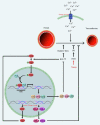The protective effect of Azadirachta indica (neem) against metabolic syndrome: A review
- PMID: 33995939
- PMCID: PMC8087850
- DOI: 10.22038/ijbms.2021.48965.11218
The protective effect of Azadirachta indica (neem) against metabolic syndrome: A review
Abstract
Metabolic syndrome is a condition associated with obesity, diabetes, dyslipidemia, and high blood pressure. Recently, the use of phytochemicals is suggested in the control and treatment of metabolic syndrome. The Azadirachta indica (neem) is an evergreen tree belonging to the family of Meliaceae. Multiple studies have been confirmed the anti-diabetic and anti-hypertension, anti-hyperlipidemia, and anti-obesity effects of neem. In this review, we reported the protective effects of neem against the complications of metabolic syndrome with a special focus on mechanisms that are involved. It has been shown that neem can control hyperglycemia and hypertension through over-expression of transcription factor nuclear factor erythroid 2-related factor 2 (Nrf2) and anti-oxidant effects. Neem also reduced the glucose uptake through up-regulation of glucose transporter 4 (GLUT4) and inhibition of key intestinal enzymes such as glucosidases. Moreover, neem showed anti-hypertensive effects possibility via the block of calcium channels, up-regulation of endothelial nitric oxide synthase (eNOS), and extracellular signal-regulated kinases 1/2 (ERK1/2) signaling pathway. Anti-oxidant effects play an important role in protective mechanisms of neem against metabolic syndrome and its complications.
Keywords: Azadirachta indica; Diabetes; Hyperlipidemia; Hypertension; Metabolic syndrome; Neem; Obesity.
Figures



References
-
- Hu G, Lindstrom J, Jousilahti P, Peltonen M, Sjoberg L, Kaaja R, etal The increasing prevalence of metabolic syndrome among Finnish men and women over a decade. J Clin Endocrinol Metab. 2008;93:832–836. - PubMed
-
- Lee W-Y, Jung C-H, Park J-S, Rhee E-J, Kim S-W. Effects of smoking, alcohol, exercise, education, and family history on the metabolic syndrome as defined by the ATP III. Diabetes Res Clin Pract. 2005;67:70–77. - PubMed
-
- Toms TE, Panoulas VF, John H, Douglas KM, Kitas GD. Methotrexate therapy associates with reduced prevalence of the metabolic syndrome in rheumatoid arthritis patients over the age of 60-more than just an anti-inflammatory effect? A cross sectional study. Arthritis Res Ther. 2009;11:R110. - PMC - PubMed
-
- Hamilton MT, Hamilton DG, Zderic TW. Role of low energy expenditure and sitting in obesity, metabolic syndrome, type 2 diabetes, and cardiovascular disease. Diabetes. 2007;56:2655–2667. - PubMed
Publication types
LinkOut - more resources
Full Text Sources
Miscellaneous
